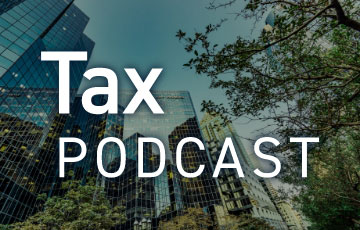Do PTE Elections Work for Companies in the Real Estate Sector?
One of the most controversial portions of the Tax Cuts and Jobs Act (TCJA) of 2017 was a limit of $10,000 on the amount of deductible state and local taxes for many individual taxpayers—also known as the SALT cap. Previously, taxpayers who itemized deductions on their federal income tax return could deduct amounts paid for state and local taxes in full. Beginning in 2018 after the TCJA was enacted, however, those deductions were limited to $10,000 for most filers.
However, this cap does not apply to business entities formed as C-corporations, and since 2018, several states have enacted legislation to impose an entity-level income tax on pass-through entities (PTEs)— such as partnerships, S-Corporations and Limited Liability Companies—to circumvent the SALT cap and provide relief to the individual taxpayers impacted by the limitation.
“This was of greater importance for states that have the highest income taxes, like New York and California,” said Catherine Shaw, Cherry Bekaert’s State & Local Tax Leader.
Since individual owners of PTEs report their proportionate share of business income on their individual income tax returns, these entity-level tax workarounds shift state taxes on PTE income from the individual owner back to the PTE itself.
Fast-forward four years, and we have seen a flurry of activity at the state level that has dramatically shifted this landscape. In fact, by 2022 more than 20 states have enacted varying rules about PTE taxes.
Although PTE elections are generally sector agnostic, we’ve witnessed specific considerations and complexities in the Real Estate sector, which we’ve detailed below in a series of questions to consider before deciding if this is best path forward for your company.
It’s all About Location
Generally speaking, PTE elections usually offer tax benefits when the entity is owned by residents of the same state that they’re making the election in. The elections are also especially beneficial if you have nonresident owners in states that don’t impose an income tax.
Given that, the most important factor to consider is the location of the property—and understanding the nuances of that state’s policies. “In South Carolina, for example, their pass-through entity election is limited to active trade or businesses. Generally, rental real estate does not always fall within the category,” said Stanton. “So that’s one unique state in which the real estate industry might not get any benefit from a pass-through entity election.”
Another key factor is: Where do the owners of the entity reside and does that state offer a credit related to the PTE? This is important because if the owner’s resident state does not offer a credit, then you run the risk of doubling your state tax burden.
For example, Virginia had issued a letter ruling stating that if you’re an S-Corp owner, you can get a credit for the tax paid at the entity level as a result of a PTE election, but if you’re a partner of a partnership, you do not. “If you have a real estate partnership with Virginia owners, a PTE election may not work,” said Stanton. The state of Virginia, however, has just recently passed its own PTE election, which appears to fix this issue for 2021 and forward.
It’s also important to understand the state’s policy on the ability to use the credit. In other words, there could be a significant lag in receiving a credit if it is not refundable, which could make this election less desirable.
PTE elections could also drastically impact your tax compliance burden, depending on the state. “In California, non-resident individuals will need to file their own return in order to receive the credit as opposed to participating in a composite filing. If you have fifty owners, that’s fifty tax returns that have to be filed,” added Stanton.
“While this new wave of legislation should result in significant tax savings for many taxpayers, there are still some unanswered questions. We are analysing new guidance as it’s released by the states to provide important direction to taxpayers in understanding all of the impacts.”
— Catherine Stanton
Cherry Bekaert’s State & Local Tax Leader
Income Considerations
The next question to ask is: How likely is it that a real estate partnership is going to generate taxable income?
“If your real estate activities are not generating profits, then you don’t have an income tax issue and there’s no point in making the PTE election,” said Sarah McGregor who serves as a Director within the Firm’s National Tax group at Cherry Bekaert. “That’s not necessarily a bad thing from a real estate perspective, because you’re often in it for the long-term appreciation of the property.”
Income is often generated for investors when the property is sold, and in today’s strong real estate market, the prices for disposing of properties are quite high and therefore an attractive option for investors. The profit from that sale could possibly be a favorable situation for a PTE election. However, the timing of the tax benefit in that scenario is often unclear, and it’s not the only method that could help lower the tax burden in this situation.
It also could be beneficial to pursue a like-kind exchange, where you are swapping current-owned real estate for another piece of real estate, and therefore deferring the gains on the taxable income from a property disposal.
Additionally, investors or partners could take the gains from the sale of a property and reinvest their proceeds into an Opportunity Zone Fund, offering another route to lessen the tax burden.
“You’re likely to see fewer real estate partnerships making this election because they’re just not anticipating profits.”
— Sarah McGregor
Director | Tax Services at Cherry Bekaert
If a real estate entity does decide to go forward with making the PTE election, the next consideration is: Where do you report that tax on the K-1?
“We’re still waiting for guidance on this. It appears that based on current law, it would end up on line 1 as a “non-separately stated item”, but only in the trade or business sections. Hopefully, the regulations will give us some guidance on that.”
There are other questions to ask, including:
- What’s the nature of the investor? Are they an active participant or are they a passive investor?
- Are they going to be able to benefit from this tax deduction approach going forward if they are subject to the passive loss rules?
- If we’re going to generate losses out of this for federal tax purposes, how does this play out on the individual’s own tax return?
“We still have lots of questions. But it’s pretty exciting anytime we can get a deduction for a taxpayer that we weren’t getting before,” added McGregor. “It’s just a little confusing right now with how it’s going to work particularly for real estate. Hopefully, we’ll be able to see some proposed regulations or IRS guidance this year.”
It’s also worth noting that the SALT cap is currently set to expire at the end of 2025, making this a temporary situation—at least for now. Given that the cap is helping to generate revenue at the federal level, it may be extended in some shape or form beyond 2025.
For more information about PTE Tax and to learn if a PTE election may be right for your tax situation, please consult your Cherry Bekaert advisor or visit our website.





